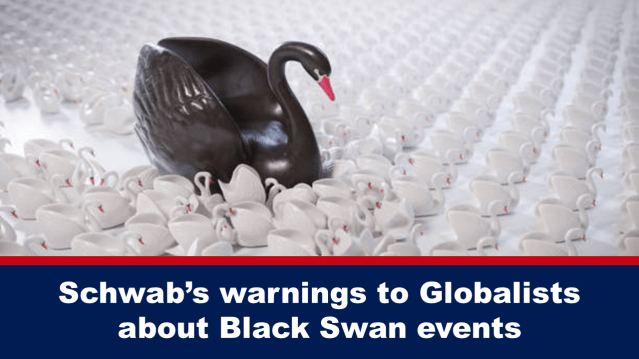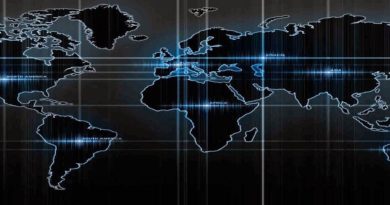Schwab’s warnings to Globalists about Black Swan events
In 2013, Klaus Schwab, founder of the World Economic Forum, began predicting “Black Swan” events threatening global security.
He predicted them again in his book ‘Covid-19: The Great Reset’ released in July 2020 and again in an interview with EuroNews later the same year.
In 2023, at the World Government Summit, he again warned about the possibility of Black Swan events, “the unpleasant surprises which will come in our way.” His use of the word “our” could easily, and probably should, be read as “their.”
Let’s not lose touch…Your Government and Big Tech are actively trying to censor the information reported by The Exposé to serve their own needs. Subscribe now to make sure you receive the latest uncensored news in your inbox…
Black-swan events, named after the belief that all swans were white until the discovery of black ones in Australia in 1697, describe extreme outcomes that were previously considered very unlikely to happen.
According to Encyclopaedia Britannica, two tendencies cause humans to be particularly susceptible to black swan events. The first is creating narratives based on what is known of the past, and the second is the notion that the past is a reliable predictor of the future.
Britannica goes on to note that the theory of black swan logic calls on people to gather as much information about the world as possible, to train themselves to review the information rigorously and to be aware of their biases. Advice which Schwab and his cronies continuously ignore as we shall see below.
The first of Schwab’s warnings in 2013 related to political Black Swan events:
“The world is still full of risks and we do not have only to address the economic risks, I think it is very important that we become more resilient in terms of the political risks,” Schwab said in a Bloomberg Television interview in Davos on 21 January 2013. “There are many Black Swans round,” he said referring to the Japan-China dispute in the East China Sea, the Syrian civil war and the nuclear inspections in Iran.
In November 2020, on being asked how he intended to begin “the reset” post-covid pandemic, Schwab told EuroNews “The first one is to make the world more resilient because we definitely will have to face other surprises, Black Swans, as they are called, maybe different kinds of viruses.”
Three months earlier, Schwab and co-author Thierry Malleret, Managing Partner of Monthly Barometer, released their book ‘Covid-19: The Great Reset’. The book described covid as a White Swan event because various institutions had predicted it; both the World Economic Forum (“WEF”) and the Coalition of Epidemic Preparedness Innovations (“CEPI”) had red-flagged the likelihood of this “pandemic.”
The word “predicted” would be more correctly replaced with the word “planned.” In October 2019 WEF, the Bill & Melinda Foundation and Johns Hopkins University held a “teaching and training” tabletop exercise to prepare public health and governments for a severe coronavirus pandemic. The exercise was called ‘Event 201’.
CEPI was founded in 2017 in Davos, Switzerland by the governments of Norway and India, the Bill & Melinda Gates Foundation, the Wellcome Trust and WEF. Members of CEPI’s board and scientific advisory committee have been, and still are, key actors in global and national responses to covid.
(Related: Cock-Up or Conspiracy? Understanding Covid-19 as a ‘Structural Deep Event’ and Dr. Jacob Nordangård: ‘UN, WEF and G20 form the Troika of Global Governance’)
The authors of The Great Reset were confident, or perhaps hopeful, that the planned covid pandemic would cause Black Swan events: “We can confidently assert that the pandemic (a high probability, high consequences white-swan event) will provoke many black-swan [sic] events through second-, third-, fourth- and more-order effects … The pandemic is not a black-swan [sic] event, but some of its consequences will be.” (See The Great Reset pg. 29)
At the World Government Summit held in February 2023, continuing along the theme he had begun 10 years earlier, Schwab was again predicting Black Swan events.
We previously published an article about his speech at the 2023 Summit in which we highlighted his remarks that whoever masters artificial intelligence and synthetic biology, among other technologies, “will be master of the world.” Below we highlight his remarks about Black Swan events.
The 2023 World Government Summit was the 10th of such summits. WEF was a founding partner of these events. As has become the Globalist mantra in recent years, Schwab began by stating that “some people [ ] claim we are now in a de-globalising world,” but, he told the Summit, “We have to re-globalise this world.”
Schwab noted the “transformations” that Schwab and his ilk are trying to impose on the world. He named two: the economic and the political transformation.
The economic transformation is being driven by energy, achieving the objectives of the Paris Agreement to decarbonise to reach “net zero” carbon emissions and “reshaping” global supply chains.
The political transformation, Schwab said, is resulting from “a world more or less dominated by one superpower into a patchwork of a multi-power world.” Schwab noted it is not only individual nation states vying for global power but also private companies that have become global powers; naming technology companies and social media companies as “global powers.” He took the opportunity to market his book ‘The Fourth Industrial Revolution’ in the process.
Unsurprisingly, according to Wikipedia, “The Fourth Industrial Revolution” is not the brainchild of Klaus Schwab, he is simply the one accredited for marketing the concept. The initiative was launched at the Hanover Fair in 2011 by physicist and businessman Henning Kagermann, physicist and formerly Germany’s Secretary of State for Education and Research Wolf-Dieter Lukas, artificial intelligence researcher Wolfgang Wahlster.
The phrase Fourth Industrial Revolution was first introduced by a team of scientists [in 2011] developing a high-tech strategy for the German government. Klaus Schwab, executive chairman of the World Economic Forum (WEF), introduced the phrase to a wider audience in a 2015 article published by Foreign Affairs. “Mastering the Fourth Industrial Revolution” was the 2016 theme of the World Economic Forum Annual Meeting, in Davos-Klosters, Switzerland.
On 10 October 2016, the Forum announced the opening of its Centre for the Fourth Industrial Revolution in San Francisco. This was also [the] subject and title of Schwab’s 2016 book.
Fourth Industrial Revolution, Wikipedia, retrieved 19 December 2023
To a limited extent, we have discussed the Globalists’ attempts to recapture the world through a new form of globalisation in previous articles, read HERE and HERE, so we won’t go into it in this article as we want to focus on Schwab’s Black Swan events.
Those who master artificial intelligence, the metaverse, neo-space technologies and synthetic biology will in some way be the master of the world, Schwab told the Summit. He gave governments and government officials some advice: seize the opportunities these technologies offer, be a frontrunner in these technologies, which requires upskilling and reskilling, and lastly, be resilient.
Schwab expanded on his idea of resilience: It is “the capability to bounce back because there will be certainly what we call the Black Swans, the unpleasant surprises which will come in our way.”
In his book, Schwab mentions “unpredictable” twice:
With technologies fusing in increasingly unpredictable ways and with state and armed non-state actors learning from each other, the potential magnitude of change is not yet widely appreciated. [pg. 79]
With the fusion of technologies, a key theme of this book, unpredictable dynamics inherently surface, challenging existing legal and ethical frameworks. [pg. 83]
The Fourth Industrial Revolution, Klaus Schwab, 2016
What Schwab, or whoever truly wrote the book, is admitting is that they are experimenting on people with these technologies and don’t know what the outcome will be.
On page 30 of the book, is a table that lists the “tipping points” expected to occur that signal substantive changes lie ahead as identified by the World Economic Forum. Two tipping points that were not included in the table, the book states, are designer beings and neurotechnology. The appendix to the book notes the positive, negative and unknowns or cuts both ways for “tipping points.”
One of the unknowns listed under “our digital presence,” for example, is the “ease of developing online social movements.” Noted under “storage for all” is the unknown “increased content creation, sharing and consumption.” Although they have listed these as “unknown or cuts both ways,” they are aware of these and will take action to mitigate effects they consider undesirable. It is the effects they have not predicted that will be concerning them.
Apart from not having a clue what experimenting on the world’s population with all their technologies might do and so are the cause of severe unexpected events, could it also be that Schwab’s warnings of Black Swan events stem from the weakness that he and his cronies simply don’t know what the backlash to their Fourth Industrial Revolution plans might be? That they are unable to predict what form these possibly multiple backlashes by potentially billions of creative and resourceful human beings around the world might take. Be unpredictable.

This article has been archived for your research. The original version from The Exposé can be found here.



